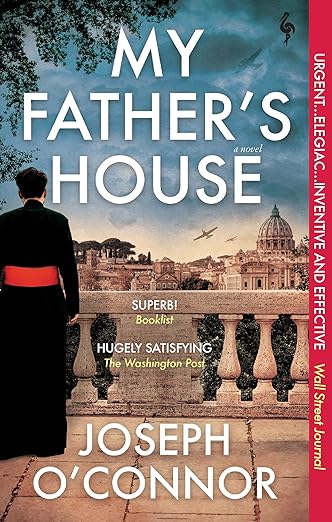My Father’s House by Joseph O’Connor
“My Father’s House” by Joseph O’Connor is a gripping historical novel set during World War II. It follows the story of Monsignor Hugh O’Flaherty, a real-life Irish priest in the Vatican who organizes an underground network to help Jews and Allied soldiers escape from Nazi-occupied Rome. The novel combines suspense, heroism, and moral complexity, painting a vivid picture of wartime bravery and the fight against oppression.
$19.00
“My Father’s House” by Joseph O’Connor is a compelling historical novel set against the tumultuous backdrop of World War II. The story revolves around Monsignor Hugh O’Flaherty, a real-life Irish priest stationed in the Vatican, who becomes a hero through his courageous efforts to save lives during one of history’s darkest periods.
The novel is set in Nazi-occupied Rome, where the presence of the Vatican provides a unique setting for resistance and espionage. Monsignor O’Flaherty, known for his sharp intellect and unwavering moral compass, leads an underground network dedicated to helping Jews, Allied soldiers, and other fugitives escape the clutches of the Gestapo. Despite the risks, he uses his position and the Vatican’s neutral status to orchestrate daring rescue missions, creating safe houses and escape routes throughout the city.
The narrative weaves together a diverse cast of characters, each with their own stories of bravery and sacrifice. Key figures include members of the clergy, Vatican officials, local partisans, and ordinary citizens who join the resistance. The interactions and relationships between these characters add depth and humanity to the story, highlighting the collective effort required to combat the atrocities of the Nazi regime.
O’Connor’s portrayal of Monsignor O’Flaherty is multifaceted, capturing his determination, wit, and profound sense of duty. The novel delves into his internal struggles, exploring the moral complexities and ethical dilemmas he faces as he balances his religious convictions with the practical demands of leading a covert operation. His relentless commitment to saving lives, despite the ever-present threat of capture and execution, underscores the novel’s themes of courage and selflessness.
The tension in “My Father’s House” is palpable, as the stakes are continually heightened by the Gestapo’s increasing efforts to dismantle the resistance network. The novel paints a vivid picture of wartime Rome, with its shadowy streets, secret meetings, and constant danger. O’Connor’s meticulous research and rich descriptive prose bring the setting to life, immersing readers in the historical context and emotional landscape of the period.
Throughout the book, the moral and ethical dimensions of the characters’ actions are explored in depth. The narrative raises important questions about the nature of heroism, the responsibilities of individuals in times of crisis, and the impact of small acts of defiance against overwhelming evil. O’Flaherty’s story serves as a powerful reminder of the difference that one person can make in the face of injustice and tyranny.
“My Father’s House” is not just a tale of wartime heroism; it is also a testament to the enduring power of faith, hope, and human solidarity. Joseph O’Connor’s masterful storytelling and nuanced characterizations create a deeply moving and thought-provoking novel that resonates with readers long after the final page is turned. Through the lens of history, the book offers timeless lessons about courage, compassion, and the enduring struggle for freedom and justice.
